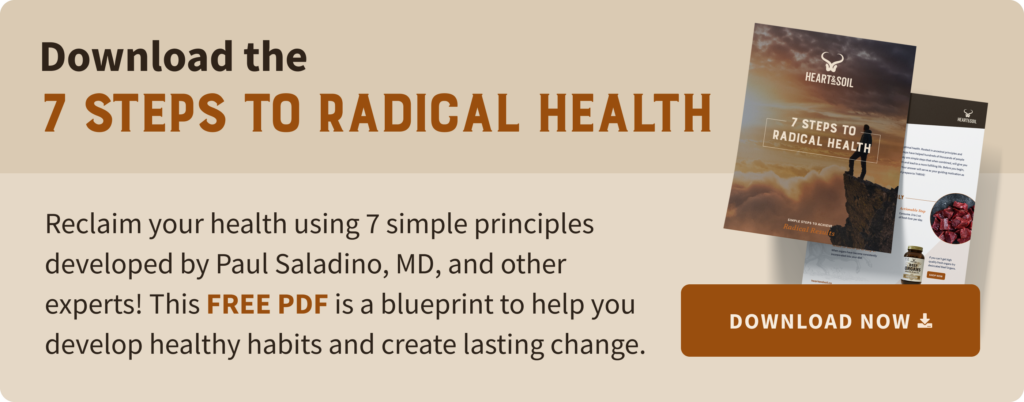PLEASE NOTE: The information in this blog is for educational purposes only. It is not a substitute for professional medical advice. Consult your healthcare provider if you’re seeking medical advice, diagnoses, or treatment.

Sarah is an active member of our animal-based community and took part in the January 2023 edition of Animal Based 30. She had some prior struggles with digestive and skin health despite eating a diet focused on whole foods.
After simple adjustments, Sarah saw improvements in her energy levels, sleep quality, and muscle tone and even got rid of persistent bloating.
Let’s take a closer look at how she did it!
How did you discover the animal-based diet?
I first heard about the animal-based diet when Joe Rogan interviewed Paul Saladino. Around that same time, I discovered Mikhaila Peterson and was amazed when I heard how her diet helped put severe lifelong arthritic and mental health issues at bay.
Two close friends told me they would be doing a 30-day animal-based challenge beginning January 1st, which made me even more curious about the whole thing!
Did you have any reservations/concerns before trying animal-based?
Oh yes! I thought the diet was absurd!
I didn’t understand how someone could thrive off of such a limited diet … what about veggies, fiber, and all the essential nutrients that one could only get through eating plants? I thought an animal-based lifestyle was surely unhealthy.
A common misconception about the animal-based diet is that it’s overly restrictive.
While we suggest prioritizing meat, organs, dairy, eggs, fruits, and certain vegetables, the main focus is avoiding highly processed foods. Eat foods that your ancestors would’ve eaten! Foods made in a lab or with dozens of artificial ingredients will likely not do you any favors.
Check out this infographic if you’re looking for more details on which foods to focus on.
What was your main motivation for going animal-based?
I have always been a thin girl and could never put on muscle or get rid of bloating after eating. I often got leg cramps and could never figure out why.
I was also afraid of the sun because I usually get moles or sun marks, and I heard from so many people all these things go away on an animal-based diet.
What was your diet and lifestyle like prior to animal-based?
Veggies, salads, chicken, nuts, potatoes, you name it. I assumed my diet was healthy since I limited gluten and processed foods.
I used stevia and monk fruit daily to sweeten drinks and food. I used a lot of different nut flours in my cooking. I ate what many would consider a “clean diet” compared to the Standard American Diet, but I understand now how flawed my diet actually was.
As Paul Saladino, MD, described throughout The Carnivore Code, many plant foods don’t want to be eaten. To protect themselves, they produce defense chemicals that can harm your health, especially if consumed excessively.
These compounds may contribute to autoimmunity, neurological issues, digestive issues, joint pain, and more. We suggest you avoid (or limit) plant foods such as leaves, stems, roots, and seeds (nuts, grains, legumes).
What challenges did you experience? How did you overcome them?
Initially, I was focused on macros and making sure I met all the DV requirements. I quickly learned that those requirements are based on the Standard American Diet, and you can get all your nutrients from the foods that you are eating!
I stopped taking all my vitamin supplements and just ate intuitively. That helped a lot. I just focused on having at least two meals a day with some fruit, and I felt good. I eat when I am hungry and try not to eat past 8 pm.
There’s no one-size-fits-all approach when it comes to your diet. Many people on an animal-based diet eat 4 or 5 smaller meals throughout the day, while others find that 1 or 2 larger meals is best for them. Some people track their intake religiously, while others go based on feeling alone.
Plus, we always encourage people to prioritize nutrient-dense foods (like meat, organs, and dairy), which allows you to cut out certain synthetic supplements.
What advice would you give to someone facing similar challenges?
Don’t worry about the daily value requirements. Instead, check in with how you feel.
Are you fatigued or bloated? Try tinkering with the amount of fat and fruit you consume. What makes you feel best?
Try spacing out your meals more. Our ancestors did not have a daily vitamin requirement guide to rely on.
If you need help figuring out the ideal amount of food to consume each day, check out this calculator from Paul Saladino, MD, or reach out to our team of health guides for further guidance.
What are the most significant changes you’ve seen since going animal-based?
My hair and nails are a lot thicker and healthier. I can go out in the sun and not worry about my skin reacting negatively to it (sunburns, moles, age spots) since I no longer have seed oils in my diet.
I am able to gain muscle and tone, and I don’t bloat. I’m more energetic, I sleep better, and I haven’t experienced any more leg cramping. My skin and mind have been much clearer as well.
How do you involve your loved ones or handle the differences in diet/lifestyle?
I slowly started talking to my sister and her husband, who are both nurses, about the animal-based diet. They were skeptical at first, but I shared some podcasts with them, and now they jumped on the bandwagon, too.
I also talked to my parents about it, and they are coming around slowly but surely. They are incorporating certain changes to their diet but aren’t animal-based yet – hopefully, in the near future, though!
Getting your loved ones on board with any diet change can be challenging. Even if they don’t make the same changes as you, you still want to be understood and supported.
The animal based diet, in particular, can be challenging as it contradicts popular narratives about red meat or vegetable consumption.

Hopefully, Sarah’s journey offers valuable information for your journey!
Remember, everyone’s journey to radical health is unique. The more unhealthy your body is at the beginning, the more challenges you may experience.
As Sarah showed us, it’s possible to notice dramatic improvements in skin health, energy levels, and digestive health (to name a few) through simple diet and lifestyle adjustments.
If you want to connect with like-minded individuals and see more success stories like Sarah’s, please check out our animal-based community! Once inside, you’ll find exclusive resources like blog posts, webinars, and thousands of others looking to improve their health with an animal-based diet.
Subscribe to future articles like this: